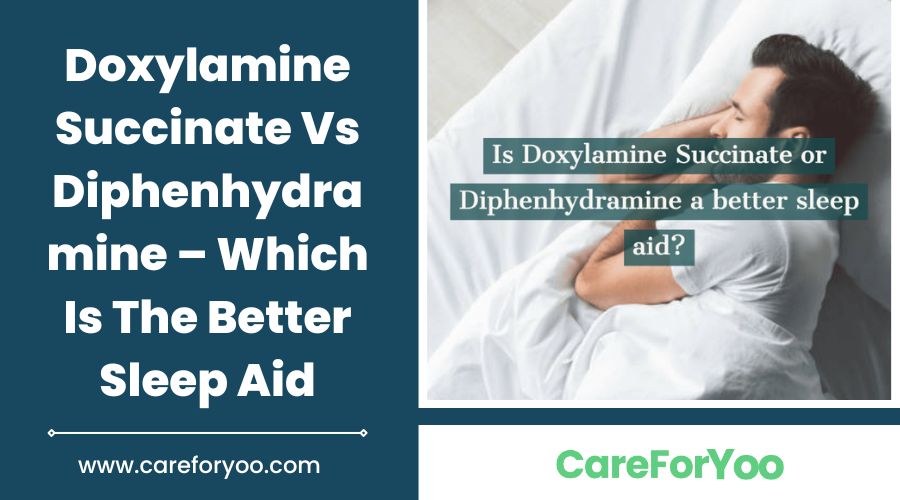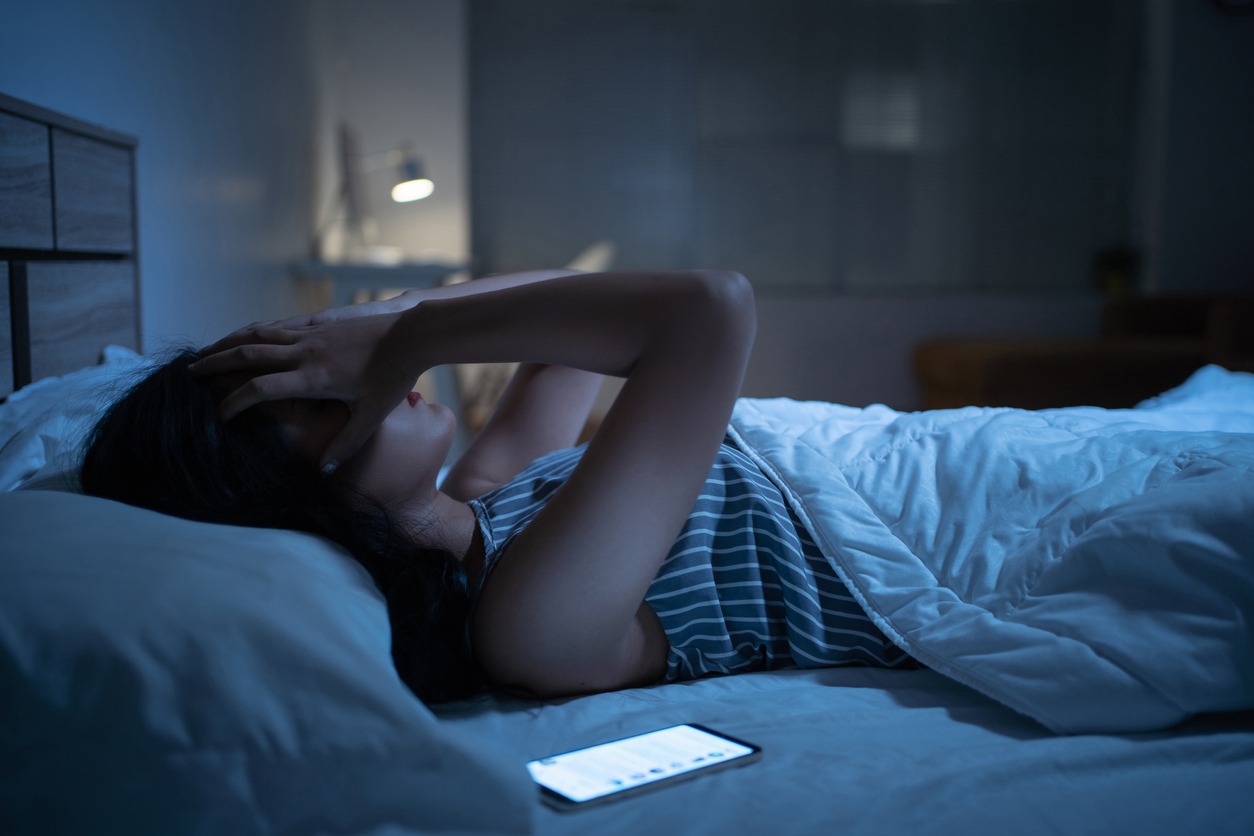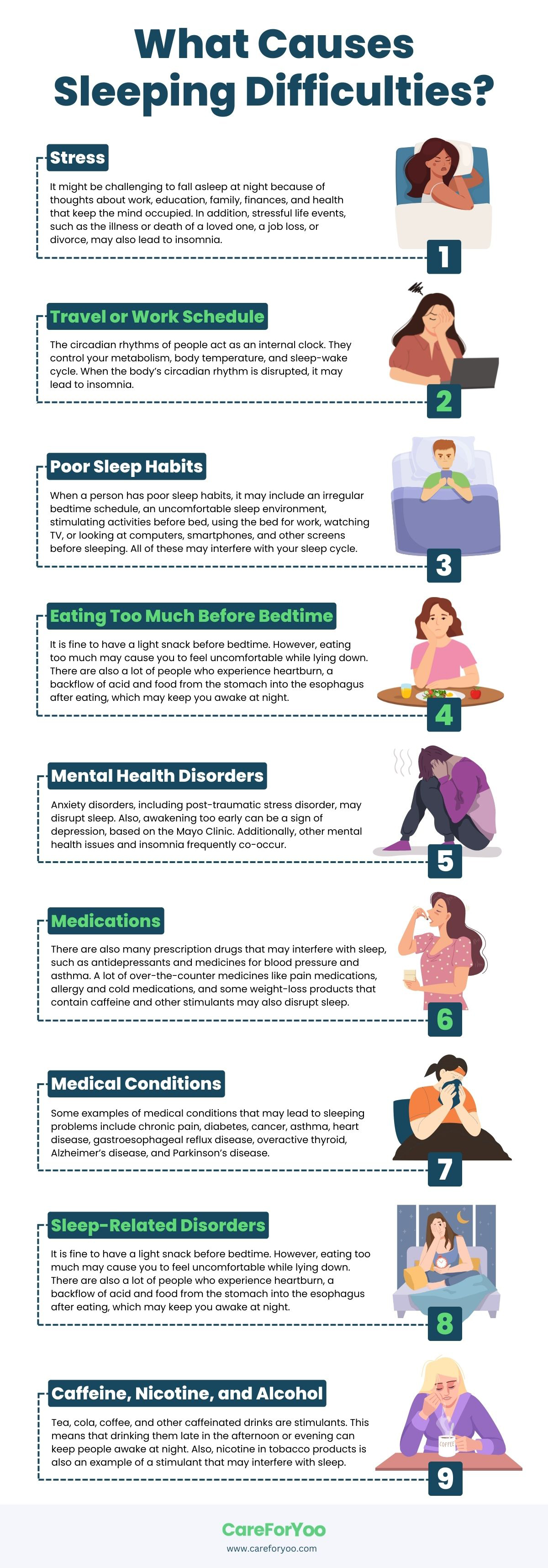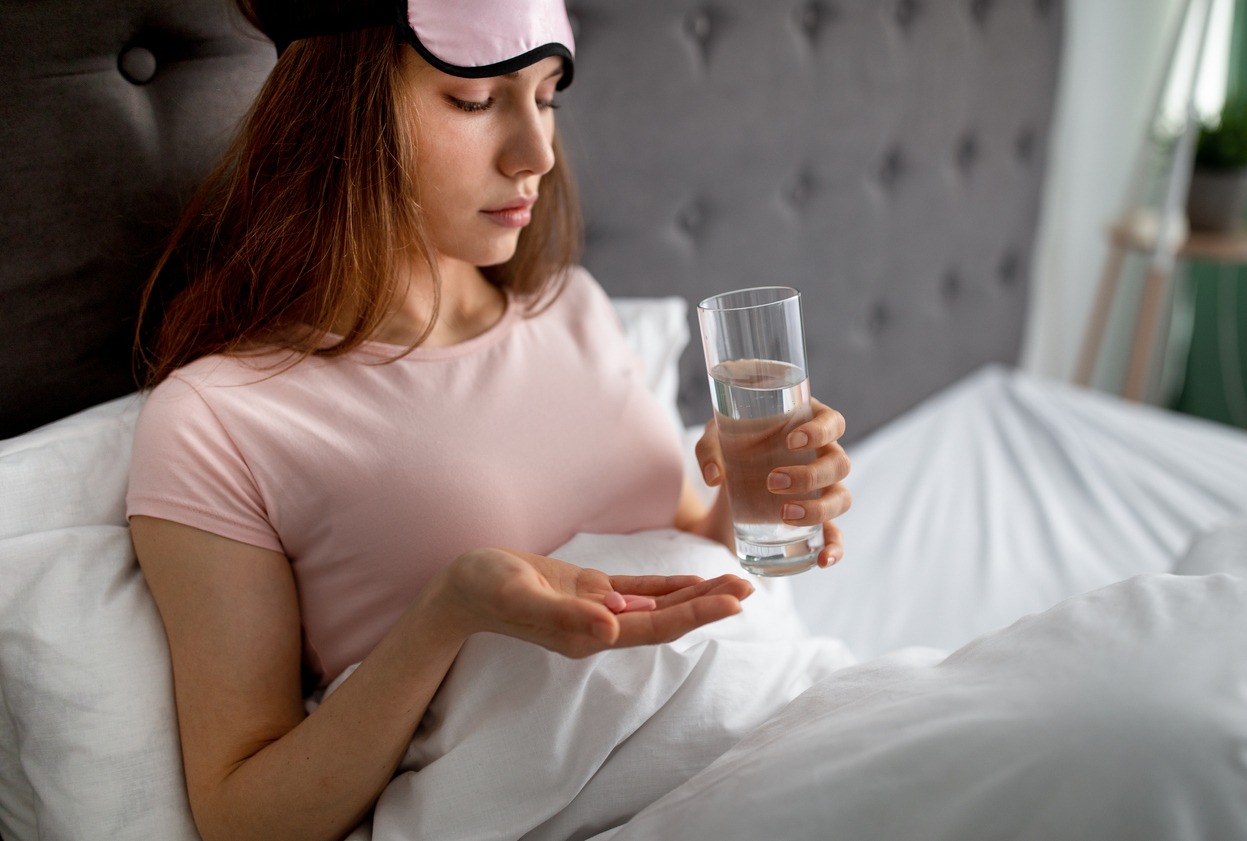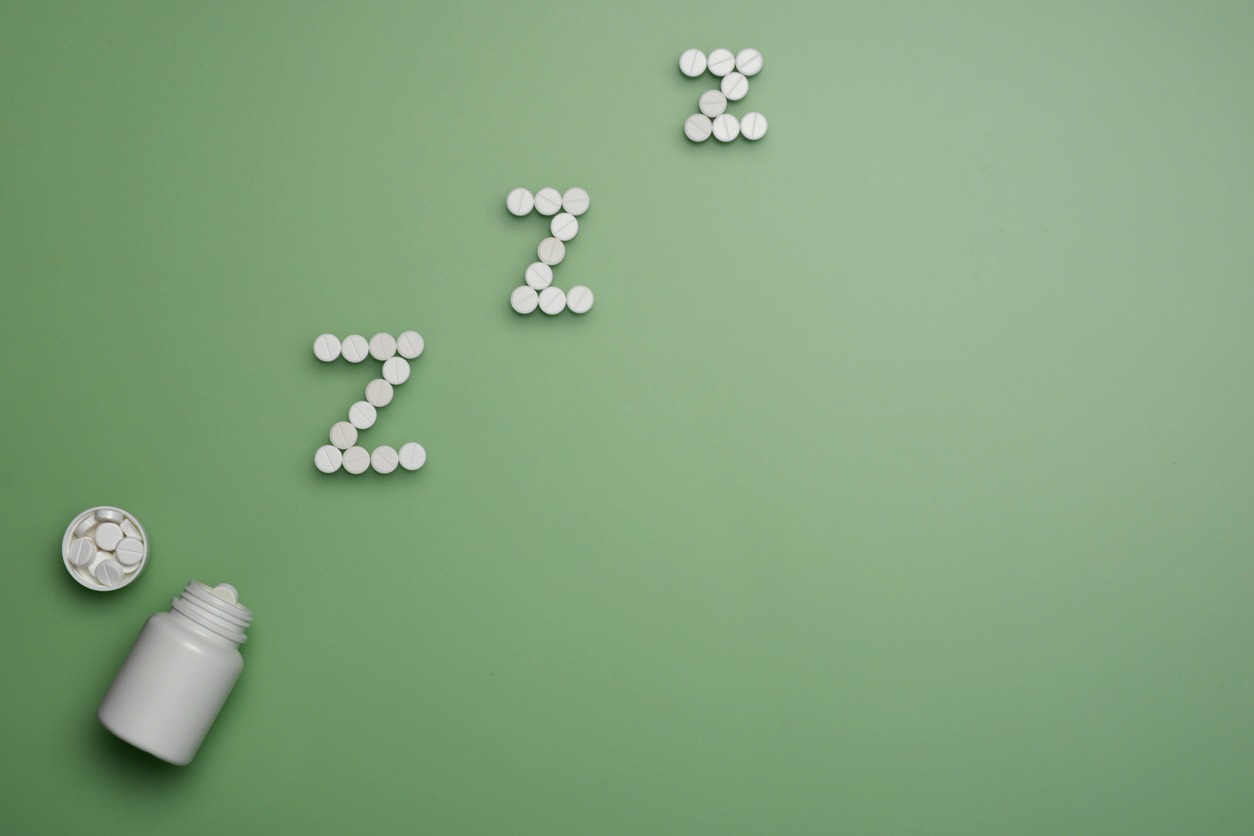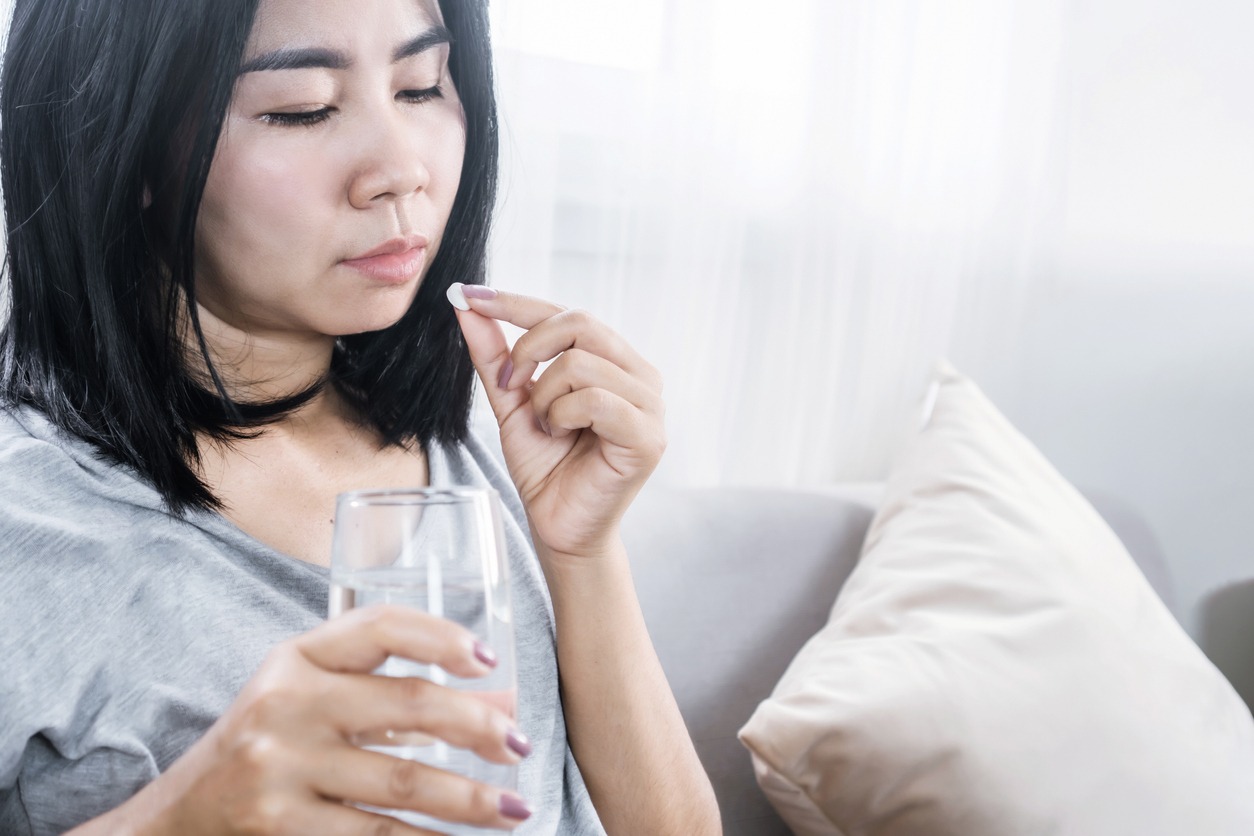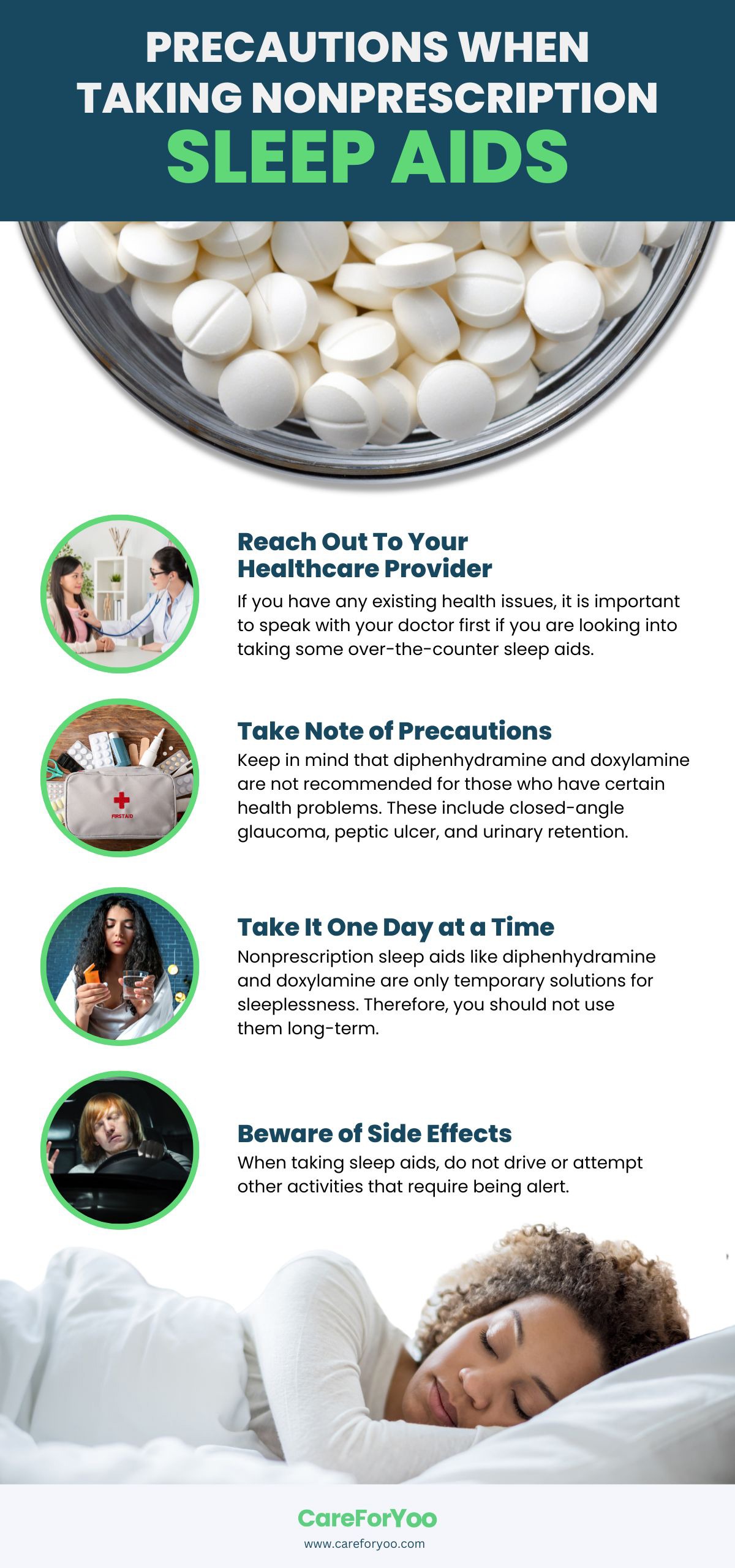A lot of people experience sleeping difficulties at some point in their lives. While some may feel refreshed and energized after only six hours of sleep, most adults need around eight hours of sleep every night to feel rested. Those who are suffering from sleeping difficulties may experience trouble sleeping at night or may wake up several times throughout the night. Other signs of sleeping difficulty may also include the inability to focus during the day, headaches, fatigue, and irritability, among others.[1]
Lack of sleep can significantly affect your performance at work and in your personal life, and no one likes to have a sleepless night. For bouts of occasional sleeplessness, over-the-counter sleep aids are available. Some of these sleep aids just contain herbal supplements like melatonin and valerian root, but most over-the-counter sleeping pills contain an active medicinal ingredient.
The common sleeping pills that fall into this category are Nytol, Unisom, and Tylenol P.M. All of these OTC sleep aids contain an antihistamine that is known for inducing drowsiness, and these antihistamines are generally considered safer and less habit-forming than prescription drugs like Ambien and Lunesta. In this article, we’ll talk about the pros and cons of Doxylamine Succinate vs. Diphenhydramine so you can make a more informed judgment on what you think you need to sleep.
ALWAYS CONSULT WITH YOUR PHYSICIAN BEFORE STARTING ANY SLEEP AIDS OR SUPPLEMENTS FOR SLEEP
What Causes Sleeping Difficulties?
Suffering from sleeping difficulties, such as insomnia, maybe a primary problem, or it may also be associated with other conditions. For instance, chronic insomnia is usually a result of stress, habits, and life events that disrupt sleep. Therefore, treating the underlying cause can resolve sleeping difficulties. However, they can also last for years.[2] Before we talk about which is the better sleep aid, let us first learn about the causes of sleeping difficulties, which you can read below:
Stress
It might be challenging to fall asleep at night because of thoughts about work, education, family, finances, and health that keep the mind occupied. In addition, stressful life events, such as the illness or death of a loved one, a job loss, or divorce, may also lead to insomnia.[2]
Travel or Work Schedule
The circadian rhythms of people act as an internal clock. They control your metabolism, body temperature, and sleep-wake cycle. When the body’s circadian rhythm is disrupted, it may lead to insomnia. Some of the causes of its disruption may include jet lag from traveling across different time zones, working early or late shifts, or frequently changing shifts.[2]
Poor Sleep Habits
When a person has poor sleep habits, it may include an irregular bedtime schedule, an uncomfortable sleep environment, stimulating activities before bed, using the bed for work, watching TV, or looking at computers, smartphones, and other screens before sleeping. All of these may interfere with your sleep cycle.[2]
Eating Too Much Before Bedtime
It is fine to have a light snack before bedtime. However, eating too much may cause you to feel uncomfortable while lying down. There are also a lot of people who experience heartburn, a backflow of acid and food from the stomach into the esophagus after eating, which may keep you awake at night.[2]
Mental Health Disorders
Anxiety disorders, including post-traumatic stress disorder, may disrupt sleep. Also, awakening too early can be a sign of depression, based on the Mayo Clinic. Additionally, other mental health issues and insomnia frequently co-occur.[2]
Medications
There are also many prescription drugs that may interfere with sleep, such as antidepressants and medicines for blood pressure and asthma. A lot of over-the-counter medicines like pain medications, allergy and cold medications, and some weight-loss products that contain caffeine and other stimulants may also disrupt sleep.[2]
Medical Conditions
Some examples of medical conditions that may lead to sleeping problems include chronic pain, diabetes, cancer, asthma, heart disease, gastroesophageal reflux disease, overactive thyroid, Alzheimer’s disease, and Parkinson’s disease.[2]
Sleep-Related Disorders
Sleep-related disorders like sleep apnea cause people to stop breathing periodically throughout the night, which interrupts sleep. Additionally, there is the restless legs syndrome, which can make it difficult to sleep since it creates uncomfortable leg sensations and an almost compulsive urge to move them.[2]
Caffeine, Nicotine, and Alcohol
Tea, cola, coffee, and other caffeinated drinks are stimulants. This means that drinking them late in the afternoon or evening can keep people awake at night. Also, nicotine in tobacco products is also an example of a stimulant that may interfere with sleep. Alcohol may help some people sleep, but it prevents deeper stages of sleep and usually causes awakening in the middle of the night.[2]
ALWAYS CONSULT WITH YOUR PHYSICIAN BEFORE STARTING ANY SLEEP AIDS OR SUPPLEMENTS FOR SLEEP
Diphenhydramine vs. Doxylamine Succinate
If you are struggling to sleep every night, you may be suffering from insomnia. Taking a pill to make you sink into dreamland may sound like magic, and there are many medications and supplements available in the market that promise a good night’s sleep. These medications include diphenhydramine and doxylamine succinate.
Both of these are antihistamines and are often used to fight allergies. They are also part of a family of antihistamines that can act on your central nervous system and have a sedating effect. Therefore, these medications can make people sleepy.[3]
What is Diphenhydramine?
Diphenhydramine is a type of antihistamine used to relieve the symptoms of allergy, the common cold, and hay fever. Some of the symptoms of these include watery eyes, rash, itchy eyes, cough, runny nose, and sneezing. It is sometimes used to prevent and treat nausea, dizziness, and vomiting caused by motion sickness. This medication can also be used to help people relax and fall asleep. It works by blocking a certain natural substance, which is histamine, that the body makes during an allergic reaction.[4]
Diphenhydramine is the ingredient most frequently used and is found in most formulations of Tylenol P.M. and Nytol. If you’re going to take a drug test soon, keep in mind that it can trigger a false positive result, as mentioned in the medsignals.com blog.
Most people report feeling drowsy after a normal dose of diphenhydramine, although this drowsiness can range from very slight to incredibly pronounced. Many people require just one dose to be able to fall asleep, although some people need a second dose in order to be able to sleep on some evenings. Diphenhydramine is eliminated quickly, and most users don’t experience any lingering grogginess from the medicine the next day. Tolerance to this particular antihistamine builds up quickly, though, and it loses its effectiveness as a sleep aid after just a few nights of repeated use.
What is Doxylamine Succinate?
Doxylamine is another type of antihistamine that is used to relieve the symptoms of allergy, hay fever, and the common cold. It also blocks the histamine and acetylcholine that the body makes to relieve allergy and cold symptoms like runny nose, sneezing, and watery eyes.[5]
Doxylamine succinate is one of the most sedating antihistamines available over-the-counter, and a single dose causes rapid and marked drowsiness in the vast majority of individuals. Doxylamine succinate is eliminated somewhat more slowly from the body than diphenhydramine hydrochloride, so while it will help you stay asleep longer, it may have somewhat of a “hangover” effect the next day. Unlike diphenhydramine, most people don’t develop any tolerance to the sedating effects of doxylamine succinate, so it may be a better choice for people who need to use an OTC sleep aid more frequently.
Which is a Better Sleep Aid?
Diphenhydramine tends to be cheaper than doxylamine succinate, and the lack of hangover effects makes it an ideal first choice for those who have never used an OTC sleep aid. If, however, a diphenhydramine sleeping pill doesn’t seem to cure your insomnia, you may want to give a doxylamine succinate-based pill a try. Over-the-counter sleep aids shouldn’t be used for longer than 2 weeks, and if your sleeplessness lasts longer than that, you’ll want to see a doctor as it could be a sign of a more serious medical condition.
For most people, though, one of the two antihistamine-based medicines covered here should solve most sleep problems. Store-brand sleeping pills contain the same active ingredients as the brand-name versions, so you can usually save money by looking for a generic alternative.
If you’re not sure which Doxylamine Succinate brand to get, we recommend this highly reviewed one on Amazon: Kirkland Doxylamine Succinate. At under $6, you might as well give it a go and see if it works for you. Kirkland also produces the most popular Diphenhydramine HCI on Amazon too, with over 970 reviews and 5 stars.
As always, we recommend only using sleeping drugs as a last resort. It’s always best to sort out any sleeping problems you may have through less invasive and arguably more effective methods. Whilst doxylamine succinate and diphenhydramine may help you fall asleep, they’re not sustainable substitutes for healthy sleeping habits.
There are many brands of sleep aids using both types of antihistamines. Here are some that have been highly reviewed on Amazon. As with any over-the-counter medication, if you are pregnant or breastfeeding, consult your doctor before using it.
Products Containing Diphenhydramine
If you are looking into trying medications with diphenhydramine to help achieve a good night’s sleep, below are some examples of products that contain this antihistamine:
Kirkland Diphenhydramine HCI 25mg
This Kirkland Brand Allergy Medicine contains 25 mg of Diphenhydramine HCI in each of the 600 mini tabs. It is comparable to Benadryl® Allergy Ultratab®. This product is for the temporary relief of sneezing and runny nose, hay fever symptoms, and itching nose or throat. This is a good choice if you can’t sleep due to allergies.
GoodSense Allergy Relief Diphenhydramine HCI 25mg Antihistamine
These Allergy Relief tablets by GoodSense are comparable to Benadryl® Allergy Ultratab®. There are 100 tablets per bottle that will help with sneezing, runny nose, itchy throat, and itchy, watery eyes.
Unisom SleepGels, Nightime Sleep-Aid, Diphenhydramine HCI
This bottle contains 100 soft gels. One soft gel per dose claims to help you fall asleep fast and get a good night’s sleep to recharge and restore your energy. It is safe to use as directed, and it is non-habit forming. These SleepGels from Unisom contain 50mg of Diphenhydramine HCI and can be given to children over 12 through adults.
HealthA2Z Extra Strength Pain Relief PM
If your sleeping problem is caused by pain, this diphenhydramine medication might work for you. Each Caplet contains 500 mg of Acetaminophen as well as 25 mg of Diphenhydramine. It is recommended for adults and children over 12 years of age. However, you should not take more than 2 caplets within a 24-hour period. It is not recommended for children under 12.
ZzzQuil Nighttime Sleep Aid LiquiCaps 25mg Diphenhydramine HCI
This sleep aid was developed by Vicks, and it claims to help people fall asleep in as fast as 20 minutes and wake up refreshed the next day. It contains a non-habit-forming ingredient, Diphenhydramine HCI, that will help you get the sleep you need. Each dose or two LiquiCaps has 50mg to help you fall asleep.
Simply Sleep Nighttime Sleep Aid Caplets with 25mg Diphenhydramine HCI
These sleep aid caplets claim to help people relieve occasional sleeplessness by easing them into sleep, so they wake up feeling refreshed and ready for their day. Each caplet has 25mg of diphenhydramine hydrochloride as the active ingredient. It can be used by adults and children ages 12 and up. It can be used for the relief of occasional sleeplessness, and it is non-habit forming when used as directed.
Products Containing Doxylamine Succinate
If you are aiming to try medications that contain doxylamine succinate for better sleep, below are some products that contain it to help you choose:
Kirkland Signature Sleep Aid Doxylamine Succinate 25mg
This medication contains 25mg of doxylamine succinate. It is a nighttime sleep aid that claims to help you fall asleep fast. You only need one tablet per dose, and it is safe and proven effective by others who have used it. One bottle contains 96 tablets.
Unisom SleepTabs. Nighttime Sleep-Aid, Doxylamine Succinate, 48 tablets
Each bottle of sleep aids from Unisom contains 48 tablets which are 48 doses. The tablets are non-habit forming and are for adults and children over 12. Children under 12 should not use them.
Amazon Basic Care Sleep Aid Tablets, Doxylamine Succinate Tablets, 25mg
These sleep aid tablets contain 25mg of doxylamine succinate. With a single one-tablet dose, it can help reduce difficulty in falling asleep. It does not contain any pain relievers, and it is gluten-free. This medication is clinically tested and proven effective. It can be used by adults and children ages 12 years and up.
WELMATE Sleep Aid Doxylamine Succinate 25mg
Each tablet of this sleep aid contains 25mg of doxylamine succinate. It is a great choice if your sleeplessness is triggered by stress related to work, school, health, family, finances, trauma, and more. It can help you get a relaxing sleep with no next-day grogginess. Just take one tablet around 30 minutes before bedtime to help you sleep faster. It is also great for travel, especially when combating jet lag or time zone changes.
Precautions When Taking Nonprescription Sleep Aids
Taking nonprescription sleep aids, such as those that contain diphenhydramine and doxylamine succinate, is generally safe, given that you do not have any other health issues. They can also be effective for an occasional sleepless night. However, there are a few cautions.
Since they contain antihistamines, taking them regularly may develop tolerance to the sedative effects of antihistamines quickly. Thus, the likelihood that they may induce sleepiness decreases as you take them for a longer period of time. In addition to that, nonprescription sleep aids may also leave you feeling groggy and unwell the following day, which is referred to as the hangover effect.[6]
If you plan to use nonprescription sleep aids like diphenhydramine and doxylamine succinate, below are some important steps that you can follow:
Reach Out To Your Healthcare Provider
If you have any existing health issues, it is important to speak with your doctor first if you are looking into taking some over-the-counter sleep aids. They will be able to tell you whether or not the sleep aid might interact with the other medications that you are taking, as well as with your underlying conditions. They can also tell you the right dosage that you can take, depending on your health and other medicines.[6]
Take Note of Precautions
Keep in mind that diphenhydramine and doxylamine are not recommended for those who have certain health problems. These include closed-angle glaucoma, peptic ulcer, and urinary retention. Aside from that, sleep aids may also pose risks for pregnant and breastfeeding women, as well as for people over the age of 65, including an increased risk of dementia.[6]
Take It One Day at a Time
Nonprescription sleep aids like diphenhydramine and doxylamine are only temporary solutions for sleeplessness. Therefore, you should not use them long-term.[6]
Beware of Side Effects
When taking sleep aids, do not drive or attempt other activities that require being alert.[6]
Conclusion
Everyone can benefit from a good night’s sleep. If you still experience sleeping troubles after taking nonprescription sleep aids, make sure to talk to your healthcare provider. They might require you some lifestyle changes and behavior therapy for you to acquire new sleeping habits and techniques for improving your sleeping environment. We hope this post helped you learn more about doxylamine succinate and diphenhydramine as sleep aids.
References
[1] Higuera, V. (2019, July 16). What you should know about difficulty sleeping. Healthline. Retrieved November 2, 2022, from https://www.healthline.com/health/sleeping-difficulty
[2] Mayo Clinic, E. (2016, October 15). Insomnia. Mayo Clinic. Retrieved November 2, 2022, from https://www.mayoclinic.org/diseases-conditions/insomnia/symptoms-causes/syc-20355167
[3] Cleveland Clinic, E. (2021, July 1). What to know about over-the-counter sleep aids. Cleveland Clinic. Retrieved November 2, 2022, from https://health.clevelandclinic.org/what-to-know-about-over-the-counter-sleep-aids/
[4] WebMD, E. (n.d.). Diphenhydramine oral: Uses, side effects, interactions, pictures, warnings & dosing. WebMD. Retrieved November 2, 2022, from https://www.webmd.com/drugs/2/drug-1428/diphenhydramine-oral/details
[5] WebMD, E. (n.d.). Doxylamine succinate oral: Uses, side effects, interactions, pictures, warnings & dosing. WebMD. Retrieved November 2, 2022, from https://www.webmd.com/drugs/2/drug-14124/doxylamine-succinate-oral/details
[6] Mayo Clinic, E. (2022, June 8). Your guide to nonprescription sleep aids. Mayo Clinic. Retrieved November 2, 2022, from https://www.mayoclinic.org/healthy-lifestyle/adult-health/in-depth/sleep-aids/art-20047860

